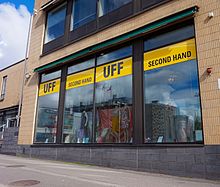Aid agency
This article includes a list of references, related reading or external links, but its sources remain unclear because it lacks inline citations. (May 2018) |

An aid agency, also known as development charity, is an organization dedicated to distributing aid. Many professional aid organisations exist, both within government, between governments as multilateral donors and as private voluntary organizations or non-governmental organisations. The International Committee of the Red Cross is the world’s second oldest humanitarian organisation and is unique in being mandated by international treaty to uphold the Geneva Conventions. The Sovereign Order of Malta, established in 1099 as the Order of St. John of Jerusalem, has an unbroken tradition of over 900 years of hospitaller activities, continuing to this day. Even in its modern guise under international law, it was recognized at the Congress of Verona of 1822, and since 1834 headquartered in Palazzo Malta in Rome, decades before the Red Cross.
Aid can be subdivided into two categories: humanitarian aid (emergency relief efforts, e.g. in response to natural disasters), and development aid (or foreign aid), aimed at helping countries to achieve long-term sustainable economic growth, with the aim of achieving poverty reduction. Some aid agencies carry out both kinds of aid, whilst others specialise on one aspect.
See also[]
- Charitable organization
- Cryptocurrency donation
- Development bank
- Effective altruism
- List of development aid agencies
References[]
External links[]
- Foreign Relations and International Aid resources from University of Colorado–Boulder
- International Aid and Development at Curlie
- AidData - a web portal for information on development aid, including a database of aid activities financed by donors worldwide
- EuropeAid Cooperation Office
- OECD Development Co-operation Directorate (DAC)
- Foreign Aid at Brookings Institution
- How Food Aid Work.
- Foreign Aid Projects 1955-2010
- Aid
- Humanitarian aid organizations
- International development agencies
- Organization stubs
